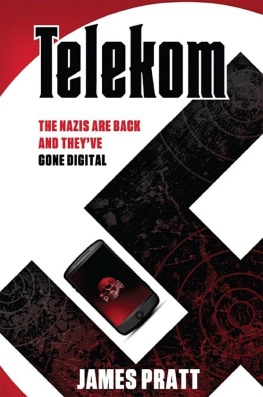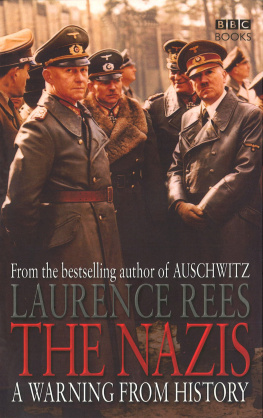James Pratt - Telekom: The Nazis Are Back and Theyve Gone Digital
Here you can read online James Pratt - Telekom: The Nazis Are Back and Theyve Gone Digital full text of the book (entire story) in english for free. Download pdf and epub, get meaning, cover and reviews about this ebook. year: 2018, publisher: James Pratt, genre: Detective and thriller. Description of the work, (preface) as well as reviews are available. Best literature library LitArk.com created for fans of good reading and offers a wide selection of genres:
Romance novel
Science fiction
Adventure
Detective
Science
History
Home and family
Prose
Art
Politics
Computer
Non-fiction
Religion
Business
Children
Humor
Choose a favorite category and find really read worthwhile books. Enjoy immersion in the world of imagination, feel the emotions of the characters or learn something new for yourself, make an fascinating discovery.
- Book:Telekom: The Nazis Are Back and Theyve Gone Digital
- Author:
- Publisher:James Pratt
- Genre:
- Year:2018
- Rating:5 / 5
- Favourites:Add to favourites
- Your mark:
- 100
- 1
- 2
- 3
- 4
- 5
Telekom: The Nazis Are Back and Theyve Gone Digital: summary, description and annotation
We offer to read an annotation, description, summary or preface (depends on what the author of the book "Telekom: The Nazis Are Back and Theyve Gone Digital" wrote himself). If you haven't found the necessary information about the book — write in the comments, we will try to find it.
James Pratt: author's other books
Who wrote Telekom: The Nazis Are Back and Theyve Gone Digital? Find out the surname, the name of the author of the book and a list of all author's works by series.
Telekom: The Nazis Are Back and Theyve Gone Digital — read online for free the complete book (whole text) full work
Below is the text of the book, divided by pages. System saving the place of the last page read, allows you to conveniently read the book "Telekom: The Nazis Are Back and Theyve Gone Digital" online for free, without having to search again every time where you left off. Put a bookmark, and you can go to the page where you finished reading at any time.
Font size:
Interval:
Bookmark:


Copyright 2012 James Pratt
Originally published by VIVID Publishing
www.vividpublishing.com.au
National Library of Australia Cataloguing-in-Publication data:
| Author: | Pratt, James, 1949- |
| Title: | Telekom : the Nazis are back and theyve gone digital / James Pratt. |
| ISBN: | 9781921787782 (pbk ) |
| Subjects: | NazisFiction. TelecommunicationFiction. |
| Dewey Number: | A823.4 |
No part of this publication may be translated, reproduced, or transmitted in any form or by any means, in whole or in part, electronic or mechanical including photocopying, recording, or by any information storage or retrieval system without prior permission in writing from the copyright owner. The publisher disclaims all liability for the content of this book.
Digital distribution Ebook Alchemy
ISBN: 9781742981574 (ePub)
Conversion by
For Geraldine
Writing this book has been a labour of love but only so because of the help and support of a wide cross section of people.
My thanks go to Grace Gordon for her diligent review of numerous drafts. To my wife Geraldine who kept me on a positive path. To Ben McCloghry, for his input on numerous cover designs. To Sean Doyle of Lynk Manuscript Assessment Service who conducted a thorough assessment and then copy edited the book.
To Michael Leung in Hong Kong, my old boss, friend and mentor and the most generous man I have ever met, and to Michael Lai of St James Settlement in Hong Kong for his assistance in getting this book into print.
To Jason Swiney and the team at Vivid Publishing who made a daunting task very simple. To my publicist, Debbie McInnes for her guidance, and to Jeff Higgins at Dennis Jones & Associates, my distributor.
Thank you all!
Despite having removed his jacket and tie, Schimmel felt as if he was sitting in a sauna, and his clothes were drenched in perspiration.
As usual, he had driven his beloved Volkswagen up from his laboratory on Lake Konigssee, over the Scharitzkehl road that skirted the state forest, to Obersalzberg, location of Hitlers Berghof and the homes of his Deputy Fuehrer, Herman Goering, and his Reichsleiter, Martin Bormann.
Schimmel parked his car at the guardhouse adjacent to the main gate of the SS Kaserne, home to Hitlers own elite bodyguard, the Leibstandarte SS Adolf Hitler, where he expected to be met by one of the security guards and driven in a Mercedes staff car to his monthly meeting with Major Von Preiss.
Today, however, there were no guards at the guardhouse. It was completely deserted. Schimmels only observation was that there was more bombing damage since his last visit in April, but surely not enough to force the SS to relocate, he thought.
Confused, he wiped the perspiration from his face and neck with his handkerchief, and slowly, in his disciplined mathematical brain, calculated that the risk to himself was greater in not attempting to report to Von Preiss than in breaching security and making his own way up to the Kehlsteinhaus.
Kehlsteinstrasse wound just over six kilometres around the side of the mountain, passing through five tunnels on its way up to the entrance of the Kehlsteinhaus, the Eagles Nest. As Schimmel eased his Volkswagen up the steep road, an occasional glance down to his left revealed the extent of the bombing, now well below him in Obersalzberg. Climbing higher, he found himself having to slow the car and carefully manoeuvre around shattered rock fragments strewn across the road, the results of more bombing. Then with only two kilometres to go, he rounded the last bend to find his path blocked by a landslide that had covered the entire road. A large truck with a canvas canopy and a Mercedes Benz sedan sat parked at the side of the road. Seeing no one in or near the vehicles, he comforted himself with the fact that at least he wasnt going to be the only one having to climb over the rubble and walk the last two kilometres to the Kehlsteinhaus, and it obviously meant that there would be someone there when he arrived.
Dr. Manfred Schimmel was 60 years old, with 25 years experience at the University of Heidelbergs faculty of Science, first as a lecturing Professor then as Head of Department. Life had been especially good to Schimmel in the 1930s leading up to the start of the war, but now his body was paying for those good years. Grossly overweight, he slipped and stumbled as he made his way slowly over the jumble of rocks and trees that the landslide had dislodged, eventually arriving on the other side soaked in sweat and gasping for breath. He found a large rock and sat down to rest. Ten minutes later, with some fresh air in his lungs, he forced himself to his feet, thrust his briefcase tightly under his arm and started to walk the remaining two kilometres. Luckily, the steepest part of the road was well below him, but the climb would still be a challenge, his only relief coming from an occasional gentle breeze, filled with the scent of the pine forest, which cooled him briefly.
He was already 30 minutes late by the time he reached the tunnel entrance, but thought he should cool down, dry off and smarten up his appearance before he saw the Major, who he knew from experience was a stickler for neatness. He might forgive Schimmel being late, but he would not forgive his shabby appearance, and Major Von Preiss had an awful temper.
Now more confused, he wondered why there were no guards in the sentry boxes on either side of the entrance but, still sweating and gasping for breath, he put it out of his mind and turned on the tap on the corrugated water tank to the left of the sentry boxes. The immediate effect of the cold, almost icy water was very pleasant, and as he rubbed his dampened handkerchief on his body he could feel his blood pressure subsiding.
Allowing himself another ten minutes to cool off fully and smarten his appearance, ensuring his jacket and tie were in place, he also used the time to gather his thoughts, for today was no ordinary meeting. Today, Schimmel was more nervous than usual, and now filled with excitement, his heart started to race again at the thought of what he was about to tell Von Preiss. At last, nearly fifteen months since the start of the project, his team had finally made a breakthrough. They had successfully concluded a lengthy experiment, showing that what theyd set out to achieve was indeed possible, and Major Von Preiss could now give the good news to Goebbels, who would in turn tell the Fuehrer.
After one last look around, Schimmel entered the tunnel and began the long walk to the lift that was concealed deep within the mountain. The temperature in the tunnel was a welcome ten degrees cooler than outside, and should have helped Schimmel to regain his composure as he made his way slowly towards the lift, but his growing apprehension made his heart race. For the first time, he was walking the 120 metres to the lift unaccompanied, fully expecting an SS guard to appear and open fire at any moment.
Finally, he arrived at the lift and pressed the large black button. A soft whirring sound indicated the lift had started its descent, and forty seconds later the lift doors opened. Schimmel stepped forward, expecting to see the usual lift operator, a civilian employee on the domestic staff, but he, too, seemed to have disappeared.
Schimmel stepped inside and studied the operating panel carefully, observing that the gold-plated handle was set to the automatic position. He pressed the single button, stepped back from the closing doors and leant against the back wall.
Next pageFont size:
Interval:
Bookmark:
Similar books «Telekom: The Nazis Are Back and Theyve Gone Digital»
Look at similar books to Telekom: The Nazis Are Back and Theyve Gone Digital. We have selected literature similar in name and meaning in the hope of providing readers with more options to find new, interesting, not yet read works.
Discussion, reviews of the book Telekom: The Nazis Are Back and Theyve Gone Digital and just readers' own opinions. Leave your comments, write what you think about the work, its meaning or the main characters. Specify what exactly you liked and what you didn't like, and why you think so.












